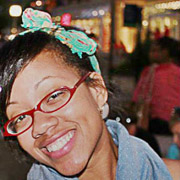#accessartdc asks the tough questions
Christina Sturdivant |
Tuesday, March 24, 2015
Elevation DC and the DCCAH's event on arts access Wednesday was designed to get people talking about the city they wanted to see.
Access to art is not a privilege. It’s a necessity, whether you’re a low-income resident or the mayor of the city.
At Elevation DC’s #AccessArtDC: Advancing cultural equity and cultural access in DC event, March 18, panelists Adele Robey, Neil Takemoto and Tendani Mpulubusi El shared their experiences navigating a system that many say has skimped on spared resources for the arts in many of D.C.’s east of the river neighborhoods.
In regions that lack a true sense of community, the ability to leverage artistic talents is vital. “The arts have a unique ability to bring people together,” said Robey, co-owner of the Anacostia Playhouse.
After closing the H St. Playhouse in 2002, Robey found Anacostia to be an ideal re-location for the facility, and she’s been successful at bringing quality performances to a neighborhood that arguably remains an arts desert. “I’ve found this to be an incredibly wonderful and welcoming community,” said Robey.
As a rental space, one of Robey’s missions is to ensure that prices at the playhouse are affordable enough for everyone to take advantage.
Unfortunately, taking into consideration the needs of longtime residents isn’t a frequent occurrence, especially by big developers, said Takemoto. His firm, the CSPM Group, works with communities to collect individual experiences to create a collective vision.
“Once you understand the heritage, you establish an entity that [defines] the future of their community,” said Takemoto, “they identify themselves as a community that deserves investment.”
Even with clear directives, obtaining resources can still be an uphill battle. “I have been to 1,000 meetings over the last few years and sometimes they lead to something and sometimes they don’t get anywhere,” said Robey, who wants to expand the playhouse and hire professional staff and teaching artists from the community. “In a number of situations, you get tired of being in meetings and you have to get out there and make something happen [yourself].”
Perhaps no one shares this sentiment more than Mpulubusi El, an Anacostia resident who’s been engaged in arts activism since his youth. When he became Ward 8 Arts Commissioner, he was the youngest to ever serve in that capacity. As a practicing visual artist, owner of a multi-media firm and chairman of the Ward 8 Arts & Culture Council, he wants nothing more than to see his community thrive through art.
“As a community, we have an opportunity to wait to see what municipalities [plan to] do or we can meet them halfway,” he said.
Mpulubusi El is working with fellow business owners to create an incubator for businesses that bring innovative services to Ward 8. Similar to Robey’s experience, he’s attended many meetings, but there’s no surefire sign that the project will ignite.
Often overlooked as capacity builders are youth. Sure, they’re always included in the vision, but they’d like to take a hand in crafting it. This was the consensus of several members of the DC Youth Poetry Slam Team, who opened the evening with three provocative performances.
“Young people have a unique opportunity to get things done because they don’t have to run the same rat race that adults do,” Mpulubusi El told one of the slam members during the question and answer period.
Being in the room and a part of this conversation was their first step, he continued.
The event was hosted in partnership with the DC Commission on the Arts and Humanities and moderated by Ward 8 Arts Commissioner Barbara Jones and Ward 7 Arts Commissioner Antoinette Ford.
“The purpose of the night was to talk about empowering,” said Lionell Thomas, director at the commission, in his closing remarks. “We talk a lot, we write these reports and put things on the shelf. This time, we have to figure out how we solve this problem. I’m ready to loosen up my tie, roll up my sleeves and work this thing out with you.”

Christina Sturdivant is a native Washingtonian who's always watching and writing about the latest cultural, community and innovative trends in the city. She's interested in people and companies that create equitable opportunities for longtime residents and transplants alike.